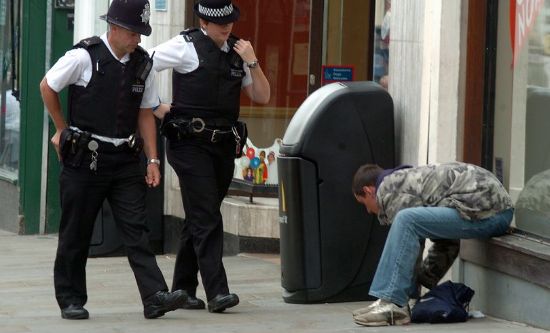
In 2021 the government pledged to get rid of the 1824 Vagrancy Act that criminalises homelessness in Britain. But it then stalled the repeal clause in the 2022 Police, Crime, Sentencing and Courts (PCSC) Act – mainly in order to give itself time to build up an arsenal of new charges. The reality is that there has been no let-up in the harassment and oppression of the most vulnerable and destitute. 1,173 people have been arrested under the Act across England and Wales since 2021. Under the guise of preventing ‘anti-social behaviour’ – something both the Conservative and Labour leaders have promised to be tough on – the brutal powers of the police to bully, push around and dehumanise rough sleepers will only grow.
End police brutality
Already by 2017, a report jointly produced by the housing charity Crisis and the National Police Chiefs Council showed how police interactions were leaving homeless people feeling more disenfranchised and more hopeless. They were being driven away from the (diminishing) services that could potentially help them and into further criminalised activity, like drug use or theft. 56% of surveyed rough sleepers felt shame or fear after police interactions. 81% said that no support was offered to them, despite 94% of councils claiming to have done so.
Interviews by Sheffield Hallam University show homeless people in general view cops as ‘bullies in badges’, who verbally abuse them, calling them ‘fucking dirty junkie’, ‘tramp’ and so on. This is how the police treat people living on the street, who are already 17 times more likely to experience violence from the public.
Beyond the Vagrancy Act
Yearly prosecutions using the Vagrancy Act have fallen since a peak of 2,762 recorded in 2014. Not out of compassion, but because newer and further reaching powers are being used in their place. In 1998 Labour introduced Anti -Social Behaviour Orders to ban people from areas of towns and ’aggressive begging’. In 2003 they added dispersal orders, expanded by the Conservatives in 2014 with Public Space Protection Orders (PSPOs). PSPOs were used on a homeless man in South Wales, who was taken to court for not leaving the park bench he had to sleep on. Another in Gloucester was fined £105 for a child dropping £2 into his sleeping bag. Many more have been arrested and given criminal behaviour orders (CBOs) just for being ‘in a position to beg’.
Surveying local councils, Crisis found that by 2017 CBOs made up 45% of all enforcement measures used on the homeless, compared to 27% under the Vagrancy Act. This trend continues with the government’s proposed Anti-Social Behaviour Action Plan. It will grant funding to 16 pilot regions for either ‘hot spot’ enforcement, with extra uniformed police, in already deprived areas or for ‘immediate justice’ which will make it easier for people to inform on each other and give the person reporting the ‘anti-social behaviour’ a say in the punishment – vigilante justice enshrined in law.
The plan expressly states it will be used on those ‘obstructing doorways’ or simply sitting near cash machines. It will also allow social housing landlords to evict tenants more easily after just ‘three strikes’. The promises it makes to guide people towards housing and addiction support ring hollow. Similar pledges were also made regarding PSPOs which never happened, while the support services themselves are facing huge cuts. (see Homeless deaths on the rise on our website.)
The tentacles of state racism
Section 4 of the Vagrancy Act contains the SUS laws, the precursor to today’s Stop and Search powers. These are used by police against black people nine times more than against white people. In parallel, the act has been used to arrest over 4,000 homeless persons in the past five years. This is just one example of how powers aimed at one oppressed section of the working class overlap with another.
The PCSC Act was sold to reactionaries as retaliation against Black Lives Matter protesters in 2020. Section 4 of the Act also targets Gypsy, Roma and Traveller encampments. The vagueness of its wording could also see it be used against homeless people sleeping in their car.
In 2018 the deceptively named Rough Sleeping Support Service bribed homelessness charities Thames Reach and St Mungo’s into collaborating into with the Border Agencies, playing the role of immigration officers in finding homeless migrants who would then be deported. The project saw homeless outreach teams doing joint shifts with Home Office agents. A number of local councils were also involved.
Criminalising poverty and resistance
Switching from a law that overtly targets the homeless to one that is dealing with ‘anti-social behaviour’ is useful for a ruling class hellbent on appealing to the most reactionary sections of the electorate. It targets the most visible consequences of homelessness: from theft and addiction to begging and obstructing doorways, which PM Rishi Sunak referred to as ‘causing nuisance’. Labour leader Keir Starmer has jumped on the bandwagon, pledging to impose ‘respect orders’ and be ‘tough on crime and the enablers of crime.’
The PCSC Act, coupled with the Public Order Act – make it clear that the ruling class will use further violence against the working class as they drive us into poverty. Given the choice between being criminalised for being poor, or criminalised for fighting back, the only course of action must be to fight back.
Joe Smith




